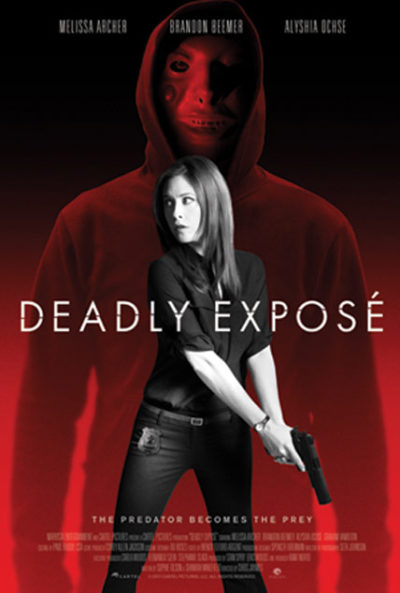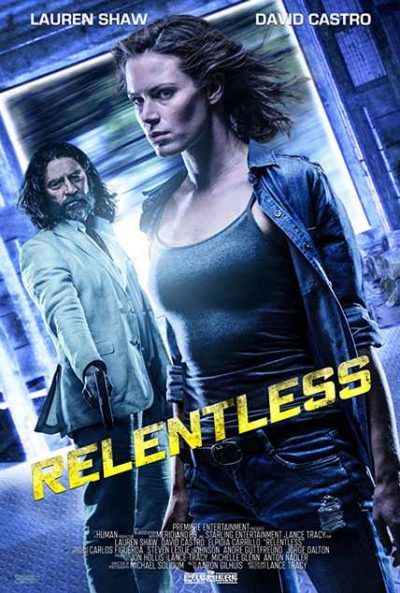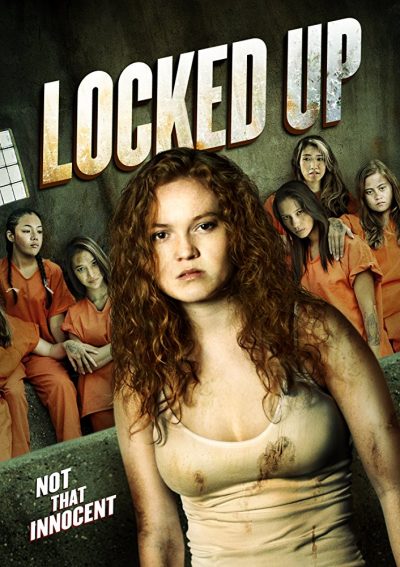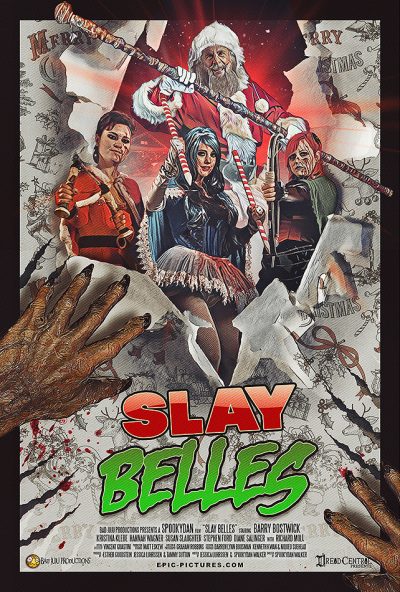★★★
“Cheaters never win.”
 After hacktivists expose the identities of users to a dating site, someone starts targeting the victims, murdering them in ways appropriate to their particular sexual fetish. Detective Maxine Peyton (Archer) leads the investigation, but it soon becomes clear that, as well as acting as a moral judge, jury and executioner, the killer has a particular interest in and connection to Maxine. Potential suspects include over-attached boyfriend and college teacher Simon (Hamilton), her cop partner Nick (Beemer), ex-husband Ryan, or even slutty best friend, Jen (Ochise), who keeps trying to hit on Simon. Might even be e) None of the above. As the bodies continue to mount, Maxine has to find the perpetrator before he/she finds her.
After hacktivists expose the identities of users to a dating site, someone starts targeting the victims, murdering them in ways appropriate to their particular sexual fetish. Detective Maxine Peyton (Archer) leads the investigation, but it soon becomes clear that, as well as acting as a moral judge, jury and executioner, the killer has a particular interest in and connection to Maxine. Potential suspects include over-attached boyfriend and college teacher Simon (Hamilton), her cop partner Nick (Beemer), ex-husband Ryan, or even slutty best friend, Jen (Ochise), who keeps trying to hit on Simon. Might even be e) None of the above. As the bodies continue to mount, Maxine has to find the perpetrator before he/she finds her.
I sense the likely destination for this was probably Lifetime or somewhere similar, yet in this case, that should not be taken as a bad thing. For especially in the early going, this is surprisingly well-written, with a good ear for dry sarcasm which helps flesh out characters that could easily be no more than stereotypes. I genuinely LOL’d at Maxine saying to an interview subject, “Please excuse my partner. He was raised by wolves.” This goes for just about everyone: even relatively minor roles, who have only a few moments of screen-time, appear to be real people. The inspiration is clearly the Ashley Madison data breach, though the company here is called “Adeline Lilly” instead – the hacktivist group responsible is also renamed, being “Incognito” rather than Anonymous. Might have been nice if the script had engaged a bit more with the moral issues here, rather than mentioning them in passing.
The problems, however, are more during the second half, as the story – and its climax in particular – relies heavily on the killer basically wanting to be caught. This is always an irritant, especially after the culprit has shown themselves to be relatively smart and savvy in the early going. It does feel like rather lazy writing, unless there has been some particular justification set up for it e.g. they have accomplished whatever it was they set out to do. In this case, that doesn’t happen, and instead someone close to Maxine is kidnapped in order to lure her in. Again, the motivation for this, and why he/she is so obsessed with her, is left rather too vague to work successfully.
Naturally, things end in a moral way, par for the TVM course: those who are guilty, in one way or another, tend to pay with their lives, while the (relatively) innocent are able to survive. While what follows is a spoiler, I have to say that does not include the killer, who is dispatched with surprising if satisfying brutality, at point-blank range. Despite my criticisms about the way things eventually unfold here, this was still a more than acceptable time-passer. Archer and the rest of the cast deliver engaging performances that were good enough to sustain interest, even when the story could have used some additional writing.
Dir: Chris James
Star: Melissa Archer, Graham Hamilton, Brandon Beemer, Alyshia Ochse





 From just about all I’ve read, the director seems entirely earnest in his desire to make a serious film about a serious problem, human trafficking in Central America. That the end result falls almost entirely wide of the mark is a bit of a double-edged sword. In terms of making its intended point, that it feels more like a B-movie from the fifties is a bad thing. But on the other hand, the serious film about the serious problem would likely be considerably less amusing.
From just about all I’ve read, the director seems entirely earnest in his desire to make a serious film about a serious problem, human trafficking in Central America. That the end result falls almost entirely wide of the mark is a bit of a double-edged sword. In terms of making its intended point, that it feels more like a B-movie from the fifties is a bad thing. But on the other hand, the serious film about the serious problem would likely be considerably less amusing. Although I haven’t read much pirate-themed fiction, I find the premise interesting; so I’ve had my eye on this historical novel ever since the BC library (where I work) acquired it. It definitely didn’t disappoint! Set mostly in the early 1720s, with some stage-setting in the years leading up to those, this action-packed tale follows the life and adventures of first-person narrator Nancy Kington (b. ca. 1704), the daughter of a Bristol merchant, who finds herself packed off to the family’s plantation in Jamaica at the age of 15, and is subsequently led by circumstances to voluntarily sign articles on a pirate ship.
Although I haven’t read much pirate-themed fiction, I find the premise interesting; so I’ve had my eye on this historical novel ever since the BC library (where I work) acquired it. It definitely didn’t disappoint! Set mostly in the early 1720s, with some stage-setting in the years leading up to those, this action-packed tale follows the life and adventures of first-person narrator Nancy Kington (b. ca. 1704), the daughter of a Bristol merchant, who finds herself packed off to the family’s plantation in Jamaica at the age of 15, and is subsequently led by circumstances to voluntarily sign articles on a pirate ship. Having enjoyed the same director’s
Having enjoyed the same director’s  It’s not often that a film cost less to make, than the television set on which I watched it. But it appears this was the case here, with the budget reportedly coming in at five hundred pounds. No, there’s not a “thousand” missing from that. £500. What you get is probably not too far from what you would expect for that – some of the aerial photography and locations do appear to represent good value for money. Budget isn’t the real issue here though. This British film’s main problem is the drastic shift in story for the final third, when it suddenly morphs, for no reason, from a SF/thriller, into a full-on zombie apocalypse which the makers have neither the budget nor the talent to depict.
It’s not often that a film cost less to make, than the television set on which I watched it. But it appears this was the case here, with the budget reportedly coming in at five hundred pounds. No, there’s not a “thousand” missing from that. £500. What you get is probably not too far from what you would expect for that – some of the aerial photography and locations do appear to represent good value for money. Budget isn’t the real issue here though. This British film’s main problem is the drastic shift in story for the final third, when it suddenly morphs, for no reason, from a SF/thriller, into a full-on zombie apocalypse which the makers have neither the budget nor the talent to depict. A painfully clunky mix of spy and crime thrillers, this really needs to decide which it wants to be. Alexandria Kingston – code name Griffin, in case you hadn’t guessed – was an abused child, with the good fortune to be rescued and brought up by Margaret Murphy, the head of Irish organized crime in Boston. Though to avoid Alex being targeted for leverage, she was never acknowledged to be part of the family. As an adult, Alex joined the CIA and became a top field agent, jet-setting over the globe on demand. But when her foster mother suffers a stroke, she returns to Boston to find herself in the middle of a war for control of the turf. The rival Killeen clan, sensing an opportunity, pounce. It’s up to Alex and her brothers to defend the family – and then take the battle to the Killeens.
A painfully clunky mix of spy and crime thrillers, this really needs to decide which it wants to be. Alexandria Kingston – code name Griffin, in case you hadn’t guessed – was an abused child, with the good fortune to be rescued and brought up by Margaret Murphy, the head of Irish organized crime in Boston. Though to avoid Alex being targeted for leverage, she was never acknowledged to be part of the family. As an adult, Alex joined the CIA and became a top field agent, jet-setting over the globe on demand. But when her foster mother suffers a stroke, she returns to Boston to find herself in the middle of a war for control of the turf. The rival Killeen clan, sensing an opportunity, pounce. It’s up to Alex and her brothers to defend the family – and then take the battle to the Killeens. We watched this Spanish film, by coincidence, on the same night as
We watched this Spanish film, by coincidence, on the same night as  Do not mistake the above rating for suggesting that this is a “good” movie. By most normal standards, it would hardly qualify. But what we have is a throwback to the glory days of exploitation, in particular Filipino women-in-prison flicks like The Big Doll House or
Do not mistake the above rating for suggesting that this is a “good” movie. By most normal standards, it would hardly qualify. But what we have is a throwback to the glory days of exploitation, in particular Filipino women-in-prison flicks like The Big Doll House or  Malorie Hayes (Bullock) is nervously heading towards the birth of a child, supported by her sister (Hayes), when a mysterious epidemic of suicidal psychosis breaks out worldwide. In the ensuing carnage, Malorie finds shelter in the home belonging to the acidic Douglas (Malkovich), whose wife dies trying to help Malorie, and a small number of other survivors. They figure out the epidemic is triggered by entities of some kind who are now prowling the planet – if you see them, you are overwhelmed by your worst fears and kill yourself. The obvious defense is not to make eye contact. Yet how do you survive in a world you cannot see? Especially when it turns out that those who were previously psychopathically inclined are immune to the effects, and are free to roam that world, with their sight intact.
Malorie Hayes (Bullock) is nervously heading towards the birth of a child, supported by her sister (Hayes), when a mysterious epidemic of suicidal psychosis breaks out worldwide. In the ensuing carnage, Malorie finds shelter in the home belonging to the acidic Douglas (Malkovich), whose wife dies trying to help Malorie, and a small number of other survivors. They figure out the epidemic is triggered by entities of some kind who are now prowling the planet – if you see them, you are overwhelmed by your worst fears and kill yourself. The obvious defense is not to make eye contact. Yet how do you survive in a world you cannot see? Especially when it turns out that those who were previously psychopathically inclined are immune to the effects, and are free to roam that world, with their sight intact. Not to be confused with RuPaul’s 2015 album (
Not to be confused with RuPaul’s 2015 album (